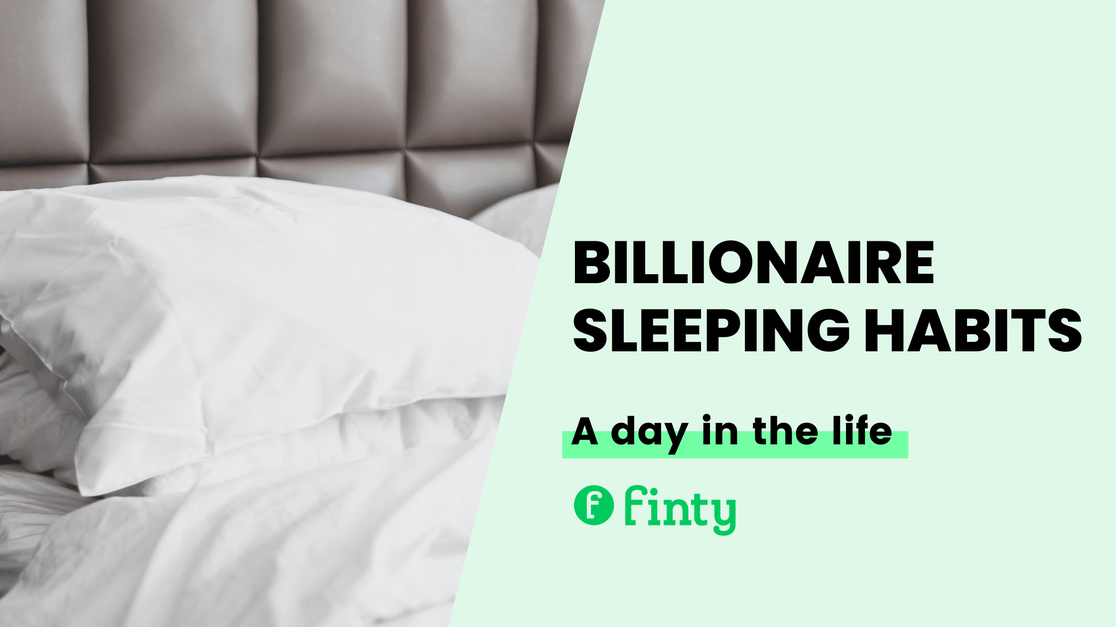Billionaires may well be operating at the pinnacle of the business world but they are still human like the rest of us. And since time is money, as Benjamin Franklin's maxim goes, billionaires need a sleep routine optimized to give them a good night’s sleep and optimum energy levels for the coming day.
If there's a pattern that emerges from studying the sleep habits of billionaires then it's worth a look in more detail. The rest of us might find some helpful tips to help us wind down and be well rested for our day ahead.

Coming up next
Exercising lightly
Numerous scientific studies have shown that fresh air and light exercise like brisk walking, stretching, or gentle yoga postures for several minutes before bed helps induce sleep. Vigorous exercise is not something you will find most billionaires doing as they wind down for the night, as it can have the opposite effect and cause insomnia.
Acclaimed fashion designer and film director Tom Ford told Harper Bazaar, “I walk the dogs around Grosvenor Square and then head up to bed. Believe it or not, I usually take another hot bath and wash my face. Then we watch a bit of television (usually things we have recorded) or read and go to sleep.”
Reading
The benefits of reading before falling asleep are obvious: reading each night improves one’s mental faculties and helps reduce stress. A 2009 University of Essex study found that reading for as little as six minutes daily can reduce stress levels by up to 68%.
Bill Gates is famous for being an avid reader, telling the Seattle Times, “I read an hour almost every night. It’s part of falling asleep.” The Microsoft billionaire also reads in the morning.
Meditating
Meditating or praying before bed induces a flow of positivity and calm feelings leading to a better and more restful slumber.
Ray Dalio, the billionaire founder of Bridgewater Associates, advocates this pre-sleep routine, saying, “Meditation, more than anything in my life, was the biggest ingredient of whatever success I’ve had.”
Planning
Highly successful people plan, visualize and channel what they want to accomplish the next day by jotting down ideas, plans, and tasks to be tackled. This clears their heads and leads to a better night’s sleep.
Planning ahead in this fashion can create a feeling of calm anticipation, knowing that you know what you need to do and will be doing the following day. Many ultra high net worth people also carry a notebook to write and manage their to-do lists.
Unplugging
Detaching from the devices that fuel you during the day — particularly smartphones, laptops, and tablets — is something everyone should do. It's no different for ultra high net worth individuals, many of whom ditch their screens for an hour with a good book.
Ironically, some of the most vocal proponents of unplugging from devices and distancing ourselves from screens at night are in the top echelon of leadership at the Silicon Valley developers of the blue light-emitting screens the rest of us can't put down.
One such example is Tim Cook, CEO of Apple, who gets to bed early so he can wake up at 3:45 a.m.
Similarly, Amazon CEO Jeff Bezos reportedly gets 8 hours of sleep per night and unplugs from work before going to bed.
Arianna Huffington, also keeps electronics out of the bedroom. She felt strongly enough about sleep and health to even write a book about it called "The Sleep Revolution".
Late Nights
You may be wondering, do any of these high performers ever stay up very late or pull an all-nighter?
The answer, at least publically, is that while some billionaires may occasionally work late into the night or pull an all-nighter to meet a deadline or close a deal, it's not a sustainable long-term approach to productivity.
Billionaire Elon Musk, famously claims to work between 80 and 100 hours per week and only gets 6 hours of sleep per night. While his sleep pattern may seem like a recipe for burnout, Musk has said that he takes short naps throughout the day to recharge his batteries.
By contrast, Warren Buffett, sets a much more gentile pace as a much older man, getting a solid 8 hours of sleep every night and keeping his schedule manageable to avoid burnout.
Constantly going to bed very late leads to decreased cognitive function and memory, obesity, depression, heart disease as well as an increased risk of accidents and errors.
Copy and paste from billionaires
There's no one-size-fits-all approach to optimizing productivity through sleep. Some billionaires thrive on short naps, some are up very early, and others prioritize getting a full night's rest.
Whether you're a billionaire or a regular hard-working man or woman trying to juggle work, family, and myriad other personal responsibilities, it's important to prioritize sleep and find a routine that allows you to get the rest you need.

